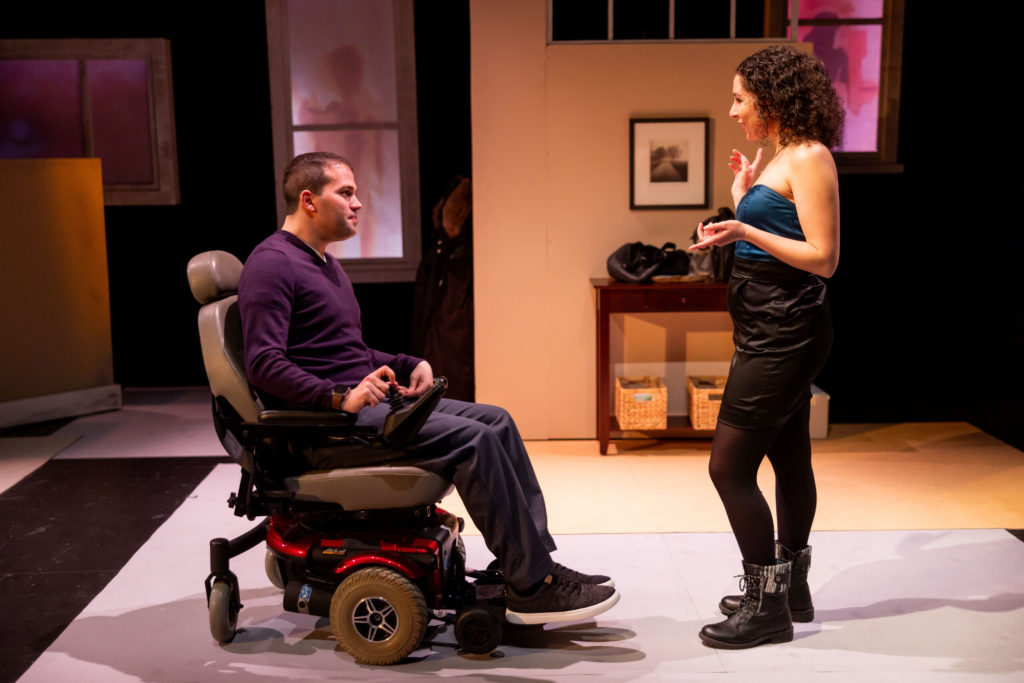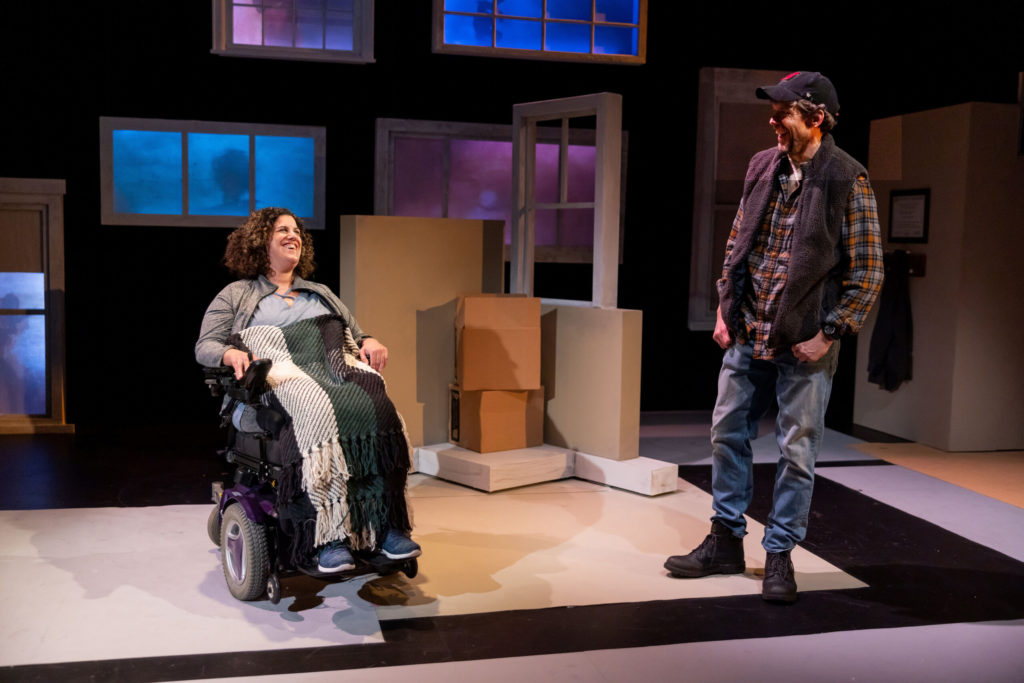
Sean Leviashvili (left) and
Gina Fonseca. Nile Scott Studios.
Presented by SpeakEasy Stage Company
By Martyna Majok
Directed by Alex Lonati
Intimacy direction by Jesse Hinson
Dramaturgy by Nontani Weatherly
Community liaison: Brennan Srisirikul
Occupational therapy consultant: Beth Cashin
Featuring: Lewis D Wheeler, Gina Fonesca, Sean Leviashvili, Stephanie Gould
March 13 – March 30, 2024
Calderwood Pavilion at the Boston Center for the Arts
Roberts Studio Theatre
527 Tremont Street
Boston, MA
1 hour 40 minutes with no intermission.
Review by Kitty Drexel
BOSTON, Mass. — SpeakEasy Stage’s Cost of Living by Martyna Majok is playing at the Boston Center for the Arts. It has themes of intimacy and loneliness. It is not appropriate for children.
Eddie (Lewis D Wheeler) and his estranged ex-wife Ani (Stephanie Gould) reunite unexpectedly after she is paralyzed in an accident. John (Sean Leviashvili), a PhD student with cerebral palsy, hires Jess (Gina Fonseca) as his aide. Cost of Living examines our inherent need for connection while taking a hard look at monetary and physical privilege.
Once, in high school, our class took a field trip to a climbing wall. I was belaying my partner, Beth, when the wall supervisor asked me why there was so much slack in my rope. I was struggling to safely keep up with my partner by keeping both hands on the belaying rope and not pulling the rope with my dominant hand to tighten the slack.
I’m paralyzed in my left arm from my shoulder blade to my fingertips. My left hand has limited motion but my body is strong. When I calmly explained my disability to the manager, he awkwardly replied, “We all have our disabilities.” I rolled my eyes and got on with my belaying.
Beth was doing her thing. We were communicating. She knew I was working on it.
The Chad’s crude blundering at my admission is a common reaction from abled folks. Western society has largely accepted racial and sexual orientation diversities. Gender diversity and its expressions have entered the lexicon. This is progress.
But, a wheelchair user can’t even take the bus without riders staring. Ableds seem genuinely surprised that disabled folks do standard human activities like wearing pants, enjoying sex, or eating a banana.
Tell us you don’t know disabled people without telling us you don’t know disabled people.
Cost of Living, a legitimately great work of theatre, is receiving the same shocked response from theatergoers that a new work featuring the disabled community receives every time one hits stages: surprise, awe, appropriate but incorrectly motivated acclaim.

Stephanie Gould (left) and Lewis D. Wheeler (right). Nile Scott Studios.
We ask that you treat our work as you would anyone’s. Applaud our excellence on its merits and not because society expects us to conform to a negative stereotype.
For what it’s worth – and it’s worth a lot- SpeakEasy Stage is doing the work. They hired Brennan Srisirikul, a disability community liaison, to work with the cast and crew. Intimacy director Jesse Henson ensured the actors were safe (not objectified into inspiration porn) and their mental healths protected.
The scenes requiring an intimacy director were well-staged by Alex Lonati and Hinson and accurate thanks to Hinson and OTC Beth Cashin. The actors did a damn fine job performing their roles; each character was presented as a whole, imperfect person. This play was as realistic as it was going to get without becoming a documentary.
Playwright Martyna Majok writes scenes in Cost of Living depicting everyday activities such as bathing and dressing. Ani (Gould) has her period while bathing. Her husband, Eddie (Wheeler) cleans her up. A menstruating body has its cycle regardless of its limb functionality. Jess (Fonesca) helps John (Leviashvili) prepare for his day as a grad student. Their normal isn’t our normal, but it is normal for them.
Majok shows us many layers of humanity in her writing. Disabled people can be smug pricks; Selfish exes can be self-sacrificing; impoverished persons can contain multitudes of wealth. There is privilege in physical ability just like there is privilege in a robust bank account. We all need empathy, compassion, and to laugh in the face of fear. Ability, or a lack thereof, doesn’t change this.
Want to read more plays about and for the disabled community? Here’s a brief, randomized list:
Atypical Plays for Atypical Actors: Selected Plays by Katie O’Reilly
Amy and the Orphans by Lindsey Ferrentino
Jellyfish by Ben Weatherill
All Of Us by Francesca Martinez
Reasons You Should(n’t) Love Me by Amy Trigg
Mary Jane by Amy Herzog (soon to be on Broadway)
